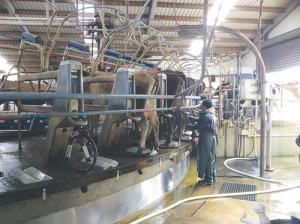DairyNZ opens applications for associate director role
DairyNZ is giving New Zealand farmers a unique opportunity to gain hands-on governance and leadership experience within the dairy sector.
 Lower order sharemilkers joining the industry over the last 12 months would be struggling to survive, says consultant James Allen.
Lower order sharemilkers joining the industry over the last 12 months would be struggling to survive, says consultant James Allen.
A leading dairy farm consultant says he’s worried that this season’s low milk price will tip some young innovative dairy farmers out of the industry.
James Allen of AgFirst, Waikato, says the most vulnerable are new variable or lower order sharemilkers just starting in the industry.
Allen did a study some years ago for DairyNZ on the state of sharemilking and is widely regarded as an expert in this area.
He says variable order sharemilkers in the 2013-14 season would have had the benefit of the higher $8.40 payout and the resulting retrospective payments. But he says those starting out in the past year and this new season wouldn’t have had the benefit of a good year.
“I feel very sorry for them because they have started out with an extremely low profit and in some cases a cash loss this year. My concern is how those guys are going to manage their cashflows to survive. We don’t want to lose good prospective farm owners.”
Allen says the key issue with a variable order sharemilker agreement is that it is a percentage based agreement, many of them negotiated well in advance of the season, when payout expectations were very good.
There is a limited number of costs these people are in control of, which limits what they can do. Their best option is to maximise production with the resources they have and look hard at their cost structure, he says.
The option of re-negotiating a contract is limited.
“The short answer is probably ‘no’, but there is no harm in bringing up the situation with the farm owner and seeing what capacity there is to renegotiate the contract. Of course the farm owner is going through the same issues with the drop in payout so he will be equally affected. [It will depend on] the capacity and willingness of the other party to look at some sort of contract renegotiation but there are no guarantees or legal requirements to renegotiate.”
Allen says people who go sharemilking need to understand that by doing so they are accepting risk. The only alternative for mitigating such risk is to go contract milking where people are not caught with the low prices.
“Last year many of the contract milkers were feeling quite aggrieved about missing out on the $8.40 payout but this year they are pretty happy about life. The key message is ‘expect more volatility’. We are going to get more of these fluctuations…. If people manage that [by shifting] to a contract milking arrangement they take the risk factor out, but if they go sharemilking they need a financial buffer to manage the highs and lows.”
Meanwhile DairyNZ’s Mark Paine says a lot of variable order sharemilkers are in Taranaki and he says through their various programmes they will target these people.
Sharemilkers lack security with the banks and are often highly geared because they are aiming for farm ownership.
He says they can get hit very hard in times of low prices.
Paine says DairyNZ will do all it can to help sharemilkers because they are the young and progressive farmers and represent the future of the dairy industry.
The World Wide Sires National All Day Breeds Best Youth Camp Best All Rounder plaudit has become family affair, with 2026 Paramount Cup winner Holly Williams following in her sister Zara's footsteps.
DairyNZ is giving New Zealand farmers a unique opportunity to gain hands-on governance and leadership experience within the dairy sector.
Herd improvement company LIC has posted a 5.2% lift in half-year revenue, thanks to increasing demand for genetics.
According to the latest Fresh Produce Trend Report from United Fresh, 2026 will be a year where fruit and vegetables are shaped by cost pressures, rapid digital adoption, and a renewed focus on wellbeing at home.
The Roar is a highlight of the game hunting calendar in New Zealand, with thousands of hunters set to head for the hills to hunt male stags during March and April.
OPINION: The past few weeks have been tough on farms across the North Island: floods and storms have caused damage and disruption to families and businesses.
OPINION: Fonterra may be on the verge of selling its consumer business in New Zealand, but the co-operative is not…
OPINION: What does the birth rate in China have to do with stock trading? Just ask a2 Milk Company.